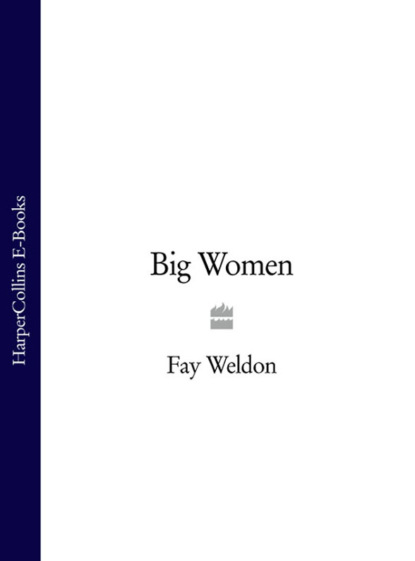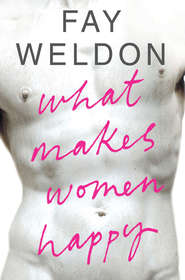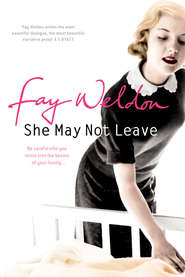По всем вопросам обращайтесь на: info@litportal.ru
(©) 2003-2024.
✖
Big Women
Автор
Год написания книги
2018
Настройки чтения
Размер шрифта
Высота строк
Поля
‘Bull wouldn’t baby-sit,’ said Zoe. ‘I had to bring Saffron along. I hope you don’t mind. You can’t blame Bull, I suppose.’
Zoe’s husband’s name was Bullivant Meadows.
‘Can’t you?’ asked Layla. ‘Why not?’ She had the plank tucked under her arm again. Zoe stopped crying and looked at it warily.
‘It seems a bit much,’ said Zoe, ‘excluding men from a meeting and then expecting them to baby-sit.’
‘I don’t see why,’ said Layla. ‘Men have babies too. And what is playing squash but a club from which women are excluded?’ Bullivant played squash for his county.
Zoe looked baffled and Stephie observed, ‘One day we will live in a world in which men aren’t called Bull.’ And they all went inside.
Now, inside there was all the generosity, jumble, untidiness, and the over-regard for the past and lack of regard for the future which typified those years. While only too anxious to do away with the social and domestic restraints of the present, everyone’s ambition was to retrieve the junk of the past and live with it. Dusty old kelim carpets covered the floors; old oak chairs collapsed under you, too worm-eaten to function; cracked glass paintings covered the walls; ships in bottles and matchstick palaces collected dust on every available shelf. Newness in objects had no value: only what was old and craftsman-made was accorded respect. In this ambience Hamish, buying cheap from little old ladies and selling dear to young professionals, made a good enough living. It was Stephanie’s misfortune to be earning her living in an advertising agency, which of all new trades was the newest, and the most ungentlemanly, being so concerned with commercial success. Hamish found Stephanie’s job difficult to accept. He came from Glasgow where his mother worked in a betting shop, and should, as his wife observed, have been accustomed enough to women working, and to frivolous and anti-social ends at that: nevertheless, he was troubled. He had hoped for finer more artistic things. And as their two little boys, Roland and Rafe, played with their Victorian toys upon the dirty floor, who was there ever at hand to take out the wooden splinters which so frequently pierced their poor little fingers? Only the au pair girl, whose face and accent kept changing, and whose nature and skill with a needle was unpredictable, and who had left last week, anyway.
Hamish, who is in his mid-thirties, muscular, glowing from within with a tawny, sexy flame, black Zapata moustache as was the fashion of the day, hiding an over-sensitive – or was it cruel – upper lip, stands in the conservatory beating a refectory table with a length of chain. Bang, bang, crash, tinkle, over and over again. Zoe comes to see what’s happening, dragging Saffron behind her in the pushchair. Saffron, disconcerted by the sight and sound of a man beating up furniture, sets up a wail.
‘All Saffron ever does is bawl,’ complains Zoe to Hamish, by way of conversation. ‘She’s so ungrateful. I’m doing this for her future not mine. She doesn’t realise the risk I’m taking. Supposing Bull throws me out?’
‘Bull, Bull, Bull,’ says Hamish. Zoe comes round quite a lot, to talk about Bull and eye Hamish up. All women eye Hamish up. They seem unable to help it, and he doesn’t even particularly encourage it. Hamish goes on banging.
Zoe goes on into the room where the meeting is to be held. It overlooks the street.
Stephanie and Layla put their pots of paint and paste and left-over posters with the other junk under the stairs. In this recess also find a Venetian glass goblet with a broken stem, an Etruscan vase in two pieces, half a Roman head with the nose eaten away, and other treasures. Two small dark boys with narrow faces and almond eyes sit impassively on the stairs and watch the grown-ups; Rafe and Roland. Both suck their thumbs and wear pyjamas.
‘Go to bed, boys,’ says Stephanie. They rise obediently and go.
‘Are they frightened of you?’ asks Layla.
‘No,’ says Stephanie. ‘They just want a quiet life. They will do anything to avoid a conversation with me, even obey me.’
Layla’s turn to go in and stare at Hamish. Bang, bang, bang.
‘What the fuck are you doing, Hamish?’
He doesn’t deign to reply. Stephie follows after to offer an explanation.
‘He’s giving it a bit of age. Antiquing it up. It’s made from new wood, but in an hour you’d never know it. Old tables fetch more than new.’
‘I’m surprised your principles allow you to tolerate this,’ says Layla.
‘Morality is a relative when it comes to antiques,’ says Stephanie.
‘A man has to make a living somehow,’ says Hamish, banging away.
‘He’s not in a good mood,’ says Stephanie, I got promotion at work today. Now I earn more than he does.’
‘Women earning more than men upsets the natural order of things,’ says Hamish. ‘Anyone can make money in advertising.’
‘You only make money in advertising or anywhere if you’re shit hot, Hamish,’ says Layla. And she enquired as to how the kids ever got to sleep in this house: she was sure she never could.
‘God knows,’ said Hamish, but he gave up banging with his chain and offered the two women the glimmer of a smile. He was not without politeness. He even enquired as to how the bill-posting had gone.
‘We’d have got more up,’ said Stephanie, ‘but we had to get back for the meeting. For all I knew you’d refuse to open the front door. Men do that kind of thing.’
Hamish said he’d left the door on the latch so women could just walk in if they felt like it and he wouldn’t have to stop work. Open house for women presumably meant just that. The point was to raise women’s consciousness, forget what kind of woman, which was never specified. Delinquent or criminally insane notwithstanding, a woman was a woman was a woman, by inference. So welcome all comers: what need of locks. Hamish did not, incidentally, think that the slogan A Woman Needs a Man like a Fish Needs a Bicycle was particularly effective. It was obscure and surely Stephanie with her training in advertising understood the folly of the opaque.
‘Besides,’ added Hamish, ‘people have more to worry about than the oppression of the female.’
‘Like what?’ asked Layla.
‘Paying their rent,’ said Hamish. ‘Saving for their funeral, their teeth falling out. Exploitation by the bosses. Hunger, penury, disease, and so forth.’
‘Show me a man having a bad time,’ said Layla, ‘and I’ll show you a woman having a worse one. I quote our mentor, Alice.’
Layla was nothing if not honourable when it came to quoting her sources. Layla had been brought up in Rhodesia. She’d run away to London when she was nineteen and gone to Cambridge for a year before being sent down for lack of application to her studies. She owned a vast house in Cheyne Walk which she filled with friends and lodgers. It was unmodernised and she complained of the cost. Layla worked in a publishing house, not because she needed the money but because, she explained, she liked to have objectives. She had to be nailed to the ground by other people’s expectations or else she’d simply fly off the face of the earth. She said what she thought, and did as she felt, a privilege granted only to those who inherit money, and who care more what they think of other people than what other people think of them.
Hamish remarked that Alice had an elegant turn of phrase, and as a token of his appreciation he would bring the meeting coffee at half-time, and how many were expected?
‘Five,’ said Stephanie.
‘It is not multitudes,’ said Hamish.
‘It is a beginning,’ said Stephanie.
Hamish began hammering again. He was courteous to his wife but estranged from her. Their eyes looked past one another. They were not easy in each other’s company. But neither spoke of it to the other: ‘talking it out’ was a concept not yet invented. Marriages were conducted in silence.
Two women now knocked upon the door, and, finding it open, simply pushed and came into the house.
‘Like a public meeting hall,’ said Hamish, with distaste, though who but he had left the door unlocked?
Daffy and Alice were the names of the newcomers. Daffy was in her late twenties. She wore a boiler suit and big boots, but the disguise merely accentuated her ravishing prettiness, the slender line from shoulder to buttock, the swell of the breasts, the slimness of ankle. Whatever she wore it was the same: she scarcely noticed any more. Alice was tiny, round-faced, dark-eyed, serious; only her eyes moved rapidly: the rest was slow: she had the gift of stillness. Alice was all mind and very little matter: she was an academic: asexual, as if too much thought had sucked her body dry.
Layla, Stephie, Daffy, Alice and Zoe. Five furies in the front room, sitting in a semicircle.
‘Dorothy couldn’t come,’ said Stephanie. ‘She had to cook the children’s tea. And Maureen decided against it. She doesn’t want to upset her father.’
‘The man’s lament,’ said Layla. ‘Where are you going, my darling? Stay home with me, wife, mother, daughter, whoever you be. Female to my male. Surely you love me? Don’t I cherish you, protect your virtue, provide the roof over your head, keep your false friends and your mother at bay? Stay home, woman, as your love for me surely dictates. Warm my bed, perfect my table, iron my shirts.’
‘Do you find that tempting?’ asked Stephanie, for something melancholy in Layla’s voice suggested that she did.
‘Of course. I’m a weak sister. Aren’t we all?’
‘No,’ said Stephie, and her accusing eyes drifted over to where Daffy sat, and her expression said, ‘Weak, weak, weak.’ And Daffy smirked.
Layla said, ‘Since this is our third meeting could we all try to be honest with one another? Say what we really think and feel? Men have made us meek little creatures: it’s to their advantage. But we weren’t born like that.’
‘There’ll be trouble,’ said Stephanie.
‘Good,’ said Layla.











